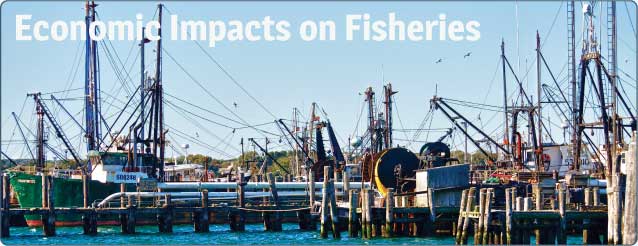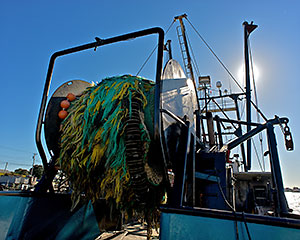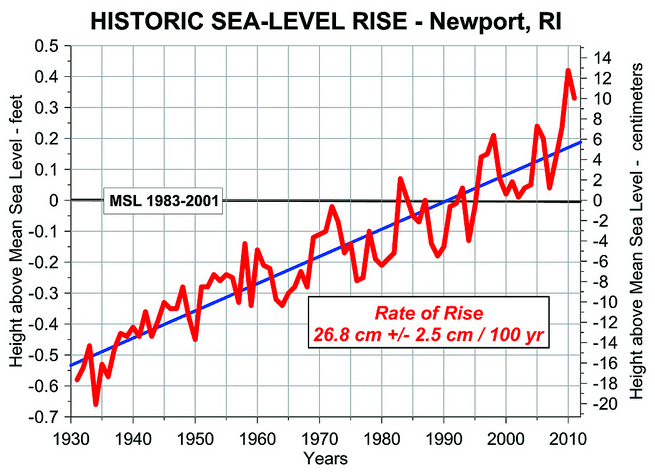
Photo Credit: Timothy Valentine, under the Creative Commons Attribution 2.0 Generic license
Catch of the Day...and Month…and Year
The fate of Rhode Island fisheries is directly tied to climate change with sea level change, ocean acidification, and ocean temperature increases potentially affecting the economic market as much as the natural habitat.
The management of fisheries is a complicated subject and there are many entities involved, including the Atlantic States Marine Fisheries Commission, the Rhode Island Department of Environmental Management, the New England Fishery Management Council, the Mid-Atlantic Fishery Management Council, and the NOAA National Marine Fisheries Service.

Fishing boat Alexis Martina tied up at Point Judith Photo Credit: Timothy Valentine, under the Creative Commons Attribution 2.0 Generic license
Fishing boats in Rhode Island waters often use a variety of gear types and are accustomed to modifying gear to target different stocks (for example, during different seasons). Therefore, if the types of fish in Rhode Island waters change, fishers may — or may not, due to necessary investments in new gear — be able to adapt their fishing practices accordingly. But gear changes necessitate capital expenditures, and therefore have an economic impact at a time when commercial fishermen have a razor-thin margin line of profit.
Many of the current regulations are being fiercely negotiated, with fishermen fighting for what they believe are their implicit rights, versus government regulators trying to maintain sustainable fisheries. Both serve the public’s interest but climate change accelerates the conflict between short-term foodstuff and long-term fish stocks.
Shifting Tides
The Rhode Island fisheries are at risk of a species shift due to climate change because of their geographic location. The Rhode Island Sound and Block Island Sound ecosystems are located at the boundary of two ecological systems that merge off Rhode Island’s coast. The impacts of climate change are of special concern because the fishery is based on a mix of cold- and warm-water species.
Those species that will shift northward with subsequent decreases in numbers in Rhode Island include American lobster, Atlantic cod, and Silver hake, while those that will potentially increase in numbers include Atlantic croaker, Black sea bass, Butterfish, Scup, and Summer flounder. Besides species shifts, the impacts of ocean acidification may cause future problems with shellfish populations. The increasing acidity of the ocean will cause shellfish to expend more energy growing their shells, resulting in unknown effects on RI shellfish harvests.
What Fishermen Can Do (Adobe Acrobat)
“These are the times of dreamy quietude, when beholding the tranquil beauty and brilliancy of the ocean’s skin, one forgets the tiger heart that pants beneath it; and would not willingly remember, that this velvet paw but conceals a remorseless fang.”
- Herman Melville, Moby Dick
News
“Tourists Are Flocking to Locations Threatened by Climate Change. That Only Makes Things Worse.” Vox
Factoids
Many cold-water species like cod are moving farther north as southern waters increase in temperature, directly impacting the fisheries in southern New England.
Fishermen will likely need to make adjustments and alterations in their equipment and fishing strategies in order to adapt to shifts in fish species distribution and abundance as key species change their range in response to climate change factors.
Warmer waters make lobsters more susceptible to disease and drive them to migrate further north to colder waters, so Rhode Island’s lobster fishermen may soon be pulling up empty pots.





